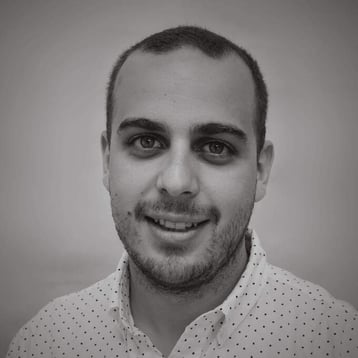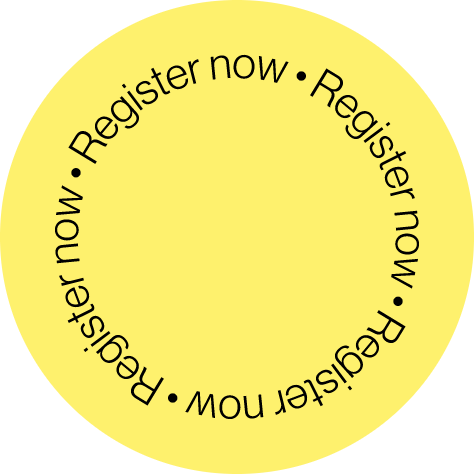
Tell us about yourself - can you give us an overview of your journey in Innovation?
When I was deciding to go to school, I didn’t have any idea innovation consulting or advertising existed. I wanted to be a computer programmer because I knew that was a job that paid, and it was going to be the future of the economy in some sense. I almost dropped out midway through my first semester but my Dad encouraged me to finish the year and then decide what I wanted to do. It was around the time that we were seeing the recovery of the subprime mortgage crisis - seeing all these tech companies get absolutely decimated - I saw a lot of value in the market. I thought it would be great to be a stockbroker or a wealth manager, so I switched into the history program at Western.
I was still thinking of becoming a wealth manager but I reached out to someone I’d met in advertising and went for an interview. I found out more about that industry and the creative process, and I ended up joining them as a strategy intern before moving into client services.
After eight months, there was a restructure on the account I was on and I got laid off - I was devastated. I moved to J. Walter Thompson, which was a really formative experience for me. It was a very process-driven, big agency. At the time, I felt like we were really jiving from a cultural perspective. Everyone I worked with was amazing.
Then, I started to see the agency world shift: media spend had never really recovered from 08/09 and there always animosity around the fact that we weren't delivering value for clients, or that the “client” briefs were off. The problem was that we weren’t providing something that added value to the client's business - we were giving them ads and that isn’t the solution to every business problem. You would look at the client’s goals and how the agency made money say, "I think these two things are in conflict," which was awful. After that, I went to a star-up agency called Mass Minority which I helped grow but felt like I really wanted to be solving problems higher up in the funnel. I ended up leaving and made my way to Market Gravity, which had just recently been acquired by Deloitte.
So what prompted the move?
I think the problem of money being wasted gets compounded depending on which market you're in. For me, it was Canada, which is a tenth of the size of the US and so you get a tenth of the budget, too. If you're working on a national brand, we're still talking tens of millions of dollars in fees that are just getting wasted. You have people like Mark Pritchard, who is going out there and saying things like the industry is spending $600 billion in media but only getting a 2% return you can’t argue with that, it’s a pretty awful return on investment.
That's what started driving it for me because no matter how hard we were working on something - or how much I was sacrificing personally - at the end of the day the underlying issue was usually with products and services. It’s like being told by a client, "You need to do this because loyalty in X is important," and then taking a step back and saying, "Actually, it’s your loyalty program that sucks and spending $5,000 to change the creative isn't going to be the solution.”
Knowing that it was my reputation with these people that meant something to me as well as knowing I wasn't going to be able to add value moving forward. It was a really big point of tension for me.
We hear that a lot from people in advertising. It’s either that they don't feel like their work is necessarily making enough impact or they're stuck in the bureaucracy of a big advertising agency. Jumping from one industry to another is another challenge - what was the learning curve like moving into an environment like Market Gravity?
Huge. First thing to mention is that Market Gravity is an acquisition. It’s part of Deloitte so, as much as I was moving to MG, I was also moving to a big-four consultancy. That said, I do think the team has done a really good job of maintaining a culture that is unique within the Deloitte ecosystem.
It was really refreshing coming to MG. You work with the client, in their office, as one team. Our consultants were hybrids between a management consultant, a design consultant, or strategy consultant, so that they can support each other when they’re slammed. In that, two of the hardest lessons to learn were the ambiguity of how you're operating, and the pace in which you operate. You have to get comfortable with it over time, and I think it took me the entire time that I was at MG to get comfortable with it. It’s always been interesting to watch junior strategists get frozen up by the data in front of them because they don't know what decision to make. For me, I believe strategy isn't about deciding what to do, it's about deciding what not to do. Bringing the client in at every step to help make those decisions is critical because it helps us understand whether what we’re doing it right, regardless of what we’re building for them. You have to trust the process.
Ambiguity is something that's often mentioned from a hiring perspective, too. Is there anything else that people moving from advertising or brands into pure innovation need to be aware of, or need to be thinking about?
I think being able to deal with that ambiguity is a personality trait. You have senior strategists that have worked within ad agencies for 20 years who struggle with it. Unless they have the perfect data set or unless they can say something with like ‘98% confidence’, they freeze up and they get mad when someone is pushing them to make the decision.
I think it's one of those things which is a blend of experience, personality and having empathy for the client. Ultimately, you are the trusted advisor who is shepherding them through the process and sometimes you're going to have to question the process or make adjustments along the way, whatever it is that you're building. You need someone who looks at process not as gospel but as a guide to shape how you get to the end result.
Do you have advice from someone who’s in advertising now but trying to move into innovation? Is there anything they can be doing something in their current role to help get them there?
I think they definitely have to show that they're an innovator, a bit of a risk-taker to some extent - or that they're trying to be. Yes, you have to have the skill set or show you're smart enough to learn the skills, but also it comes down to personality. If you're going to be working for six weeks or on a three-month engagement with a client, you’re going to be in a room with them from 8am until 6pm for weeks on end. So someone has to be able to look at you and say, ‘I can work in the trenches with this person’. You need to be a partner to them.
How has your perspective of innovation changed from when you were working in the advertising space?
It's interesting because I think advertising can be very innovative but also so can any adjacent industry - it's down to how they own it and operate it. I learned recently that Idea Couture had the largest amount of Phd level researchers vs. any other innovation consultancy (in Toronto). Their process is very, very research heavy and aims to figure out exactly what the right question to ask is. On the other hand, MG is about putting the customer first and sprinting through it. So, I think innovation can mean something different to any group, and I don't think that's wrong - there's enough runway for it to mean that. It's okay for it to be broad and ambiguous, and to have each business define what it means for them and how it's going to impact a client's business.
What led you to starting up your own consultancy - Elemental?
It's funny, being an entrepreneur is the most rewarding experience I've ever had, and it’s the hardest thing I’ve ever done.
I really enjoyed my time at Deloitte and MG but fundamentally when an opportunity came for me to advise a private company and take an equity position in it, it was something I couldn’t have done in a big-four consultancy. For me, it was the personal motivation to do something interesting combined with the opportunity to take the risk to financial reward which was the main driver.
Essentially, I ran my own model - I took my experience across advertising and consulting and I put it together. I workshopped on weekends in my condo. I looked at my future competitors and thought, how could all of these consultants within this one group be these amazing experts across so many categories? In banking, in telco, in oil and gas, in tech, in AI, in blockchain? The majority of the time a project team is staffed on who's available and that's not right. Every client's business is unique, so how do we service that?
With Elemental, the brief is in the name. Elemental is a sum of parts. For each project, we have a lead consultant who builds a team around them, depending on the needs of the client and the challenge. We look at the freelance talent pool or the contractors that are out there, where you’ve got people with 10 or 20 years of experience across categories; people in their 40s and 50s; ex-executives that are looking to do something. That's the talent pool I want to bring to my clients. I want to focus on the question we’re solving and the people who can help us find the solution.
It's about really trying to bring the pieces together and tackling a client's problem in a way that's unique to them. You can't just assume that the 20 people you have in your office, or 100 or 200 consultants, are going to be the right ones every time.
That's interesting. Do you think innovation consulting will evolve so that there are more companies like Elemental, or is the challenge to disrupt too big when you have big players like Accenture who are bringing the talent in-house through acquisitions?
I think if you’re going to relay on growth through acquisition that it’s a horrible idea. If we look at the statistics around it, most of the data shows M&A transactions fail 50% of the time. They'll fail to achieve the synergies or the right outcome. So I think that if your only ability to grow capability is through acquisition, that's a fundamental business problem that you need to look at.
Clients are wising up to the fact that it isn't just about spending money anymore - it's about being surgical and precise with that money. If you're going out to service a wide group of customers, then yes - having an organization of 5,000 or 10,000 people makes sense - but you don't need a marketing department or a partner that is trying to scale to that size too. Now, it’s about looking at every business unit as something that should be unique, and creating something bespoke to the problem they're trying to solve. I think clients have become fed up with not getting what they've asked for - tangible business results. The economy is changing and we can't get away from that fact.
In terms of the innovation consulting industry, how do you see it shifting to take on that challenge?
It depends on the client but I think we need to look at client services more holistically in innovation. We're in there trying to augment or support their business objectives, so we kind of have to look at it and say how are we going to do right by them? We need to look at it like a true partnership that uses collaboration to deliver impact and you have to be really thoughtful with how you're delivering, too. You don't want to deliver a strategy deck that sits in a binder in a client's office. You want them to go and build it, so you have to figure out a way to make your client comfortable along the way, and you're going to need to figure out new ways to do that each time.
How can business owners adapt their business model to deal with some of the changing demands of clients? How can they be more agile and more collaborative with clients, more impactful, more value driven?
I think for innovation consultancies, you have to scale a business if you want to achieve certain financial goals and be able to move into other markets. We need to look at it and say, how could we stay lean? How can we measure our results as quickly as possible, and scale in a way so that we can go out there and achieve financial success, but also do it in a good way for our client.
The other thing is that we have to understand we're not going to be right for everyone. It doesn't mean that we only play in North America - I think it’s the opposite because our methodology works regardless of where you’re based. We might not be going to companies with a $10 billion market cap or larger, but we can still give clients an opportunity to punch above their weight and get access to great talent without any of the fluff that exists in the current consulting model.
How do you see the state of the industry today, and how do you see it changing over the next few years?
That's an interesting question. Firstly, I think innovation consultants - or more broadly innovative thinkers - are going to have a bigger voice in the boardroom. When we look at where the decisions are being made, and where the strategies are being developed, I think the C-suite is demanding different approaches now.
As well, I think M&A as a practice is ripe for disruption. As you scale up, you have big companies like GE making a multi-billion dollar acquisitions which have turned into multi-billion dollar write downs. Moving forward, I think shareholders are going to punish that type of behavior - not just at GE but at every company, especially if the company is private and doesn’t have access to the public markets for raising capital. I think innovation is going to come in there, helping companies to look at how to take risk out and make sure that they’re setting aside capital to help grow these investments.
Finally B2B is going to come into vogue. At the end of the day, people are looking for an experience that's similar to the things they experience as a regular consumer, so I think finding how businesses market to other businesses is going to change. I think we're going to be building more empathy and trust with our clients and their customers, and I think customers are going to start demanding more perfection not just in the proposition but it it’s execution.



